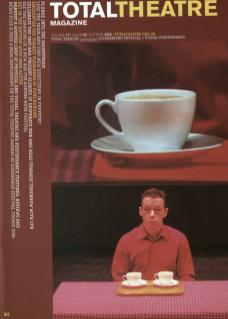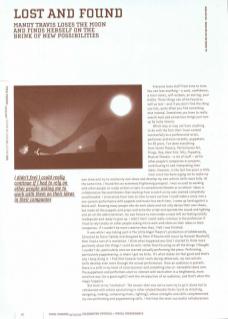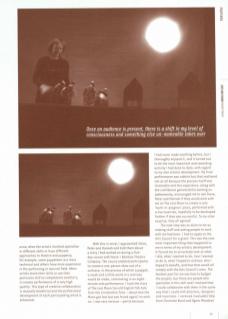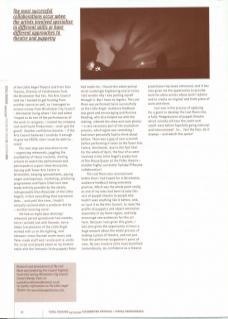Everyone loses stuff from time to time. You can lose anything – sock, confidence, a train ticket, self-esteem, an earring, your bottle. These things can all be found as well as lost – and if you don't find the thing you lost, quite often you find something else instead. Sometimes you have to really search hard and sometimes things just turn up by lucky chance.
Which may or may not have anything to do with the fact that I have worked successfully as a professional actor, performer and more recently, puppeteer, for 30 years. I've done everything from Street Theatre, Performance Art, Fringe, Rep, West End, Telly, Puppetry, Musical Theatre – a lot of stuff – all for other people's companies or projects, contributing to and interpreting their ideas. However, in the last few years a little inner voice has been urging me to make my own show and try to realise my own ideas and develop my own artistic skills more fully. At the same time, I found this an extremely frightening prospect. I was so used to working with other people on ready written scripts in conventional theatre or on others' ideas in collaborative/devised theatre that starting from scratch on my own seemed completely unachievable. I tried alone from time to time to work out how I could make a story into a one-person performance with puppets and music but each time, I came up hard against a blank wall. Knowing many people who do work alone and not only devise their own shows, but make all the puppets and props and write the script and operate the sound and lighting and do all the administration, my own failure to even make a start left me feeling totally inadequate and ready to give up. I didn't feel I could really continue in the profession if I had to rely totally on other people asking me to work with them on their ideas in their companies. If I couldn't be more creative than that, I felt I was finished.
It was while I was taking part in The Little Angel Theatre's production of Jabberwocky (directed by Steve Tiplady and designed by Peter O'Rourke with music by Hannah Marshall) that I had a sort of a revelation. I think what happened was that I started to think more positively about the things I could do well, rather than focusing on all the things I thought I couldn't do, particularly once we started actually performing the piece. Performing, particularly puppeteering, is where I get my kicks. It's what makes me feel good and that's why I keep doing it. I find that however hard I work during rehearsals, my own artistic skills develop even more through the actual performance. Once an audience is present, there is a shift in my level of consciousness and something else un-nameable takes over. The puppeteers and performers start to interact with each other in a heightened, more sensitive way (on a good night!) with the introduction of an audience, and that's when the magic happens.
But back to my 'revelation'. The answer then was not to even try to go it alone but to collaborate with artists specialising in other related theatre forms (such as directing, designing, making, composing, music, lighting), whose strengths and skills complemented my own performing and puppeteering skills. I feel that the most successful collaborations occur when the artists involved specialise in different skills or have different approaches to theatre and puppetry: for example, some puppeteers are more technical and others have more experience in the performing or musical field. When artists share their skills or use their particular skill to complement another's, it creates performance of a very high quality. This type of creative collaboration is mutually beneficial and the professional development of each participating artist is enhanced.
With this in mind, I approached Steve, Peter and Hannah and told them about a story I had worked on during a five-day course with Horse + Bamboo Theatre Company. The course enabled participants to create a one-person show out of a suitcase, in the process of which a puppet, a mask and a little world in a suitcase would be made, culminating in an eight-minute solo performance. I took the story of The Lost Moon (an old English folk tale from the Lincolnshire Fens-about how the Moon got lost but was found again) to work on. I was very nervous – partly because I had never made anything before, but I thoroughly enjoyed it, and it turned out to be the most important and rewarding activity I had done to date, with regard to my own artistic development. My final performance was rubbish but that mattered not at all because the process itself was invaluable and this experience, along with the confidence gained whilst working on Jabberwocky, encouraged me to ask Steve, Peter and Hannah if they would work with me on The Lost Moon to create a solo 'work-in-progress' piece, performed with a live musician, hopefully to be developed further if that was successful. To my utter surprise, they all agreed!
The next step was as alien to me as making stuff and asking people to work with me had been. I had to apply to the Arts Council for a grant. This was the next most important thing that happened to me in terms of my artistic development. It forced me to accurately look at what I did, what I wanted to do, how I wanted to do it, what I hoped to achieve, who I hoped to benefit, and how that would all comply with the Arts Council's aims. The hardest part for me was how to budget the project, but there are people who specialise in this skill and I realised that I could collaborate with them in the same way that I could with directors, designers and musicians. I received invaluable help from Charlotte Bond and Agnes Meadows of the Little Angel Theatre and from Sian Thomas, Director of Celebrations from the Winchester Hat Fair. The Arts Council told me I needed to get funding from another source as well, so I managed to extract money from Winchester City Council – Winchester being where I live and where I hoped to do two of the performances of the work-in-progress. I named my company Lost and Found Productions – and I got the grant! Another confidence booster – if the Arts Council believed I could do it enough to give me £5000, then I must be able to... scary!
The next step was also alien to me – organising rehearsals, juggling the availability of those involved, inviting schools to watch the performance and participate in a post-show discussion, liaising with Tower Arts Centre in Winchester, keeping spreadsheets, paying wages and expenses, marketing, producing programmes and flyers (that last item made entirely possible by the utterly indispensable Glen Alexander of the Little Angel); in fact everything that a producer does... and until this time, I hadn't actually realised what a producer did do – another learning curve.
We had an eight days devising/rehearsal period spread over two months; twice I worked just with Hannah, twice Adam Crossthwaite of the Little Angel worked with us on the lighting, and between-times Hannah wrote music and Peter made stuff and I wrote and re-wrote the script and played alone on my kitchen table with the fantastic little puppets Peter had made me. I found this whole period mind-numbingly frightening and at times I did wonder why I was putting myself through it. But I have no regrets. The Lost Moon was performed twice successfully at the Little Angel. Audience feedback was good and encouraging and Korinna Roeding, who also helped out with the making, videoed the show and took photos – a very necessary part of the evaluation process, which again was something I had never personally had to think about before. There was a gap of over a month before performing it twice at the Tower Arts Centre, Winchester, due to the fact that for the whole of April, the four of us were involved in the Little Angel's production of The Mouse Queen at the Polka theatre – another highly successful Tiplady/O'Rourke collaboration!
The Lost Moon was received even better than I had hoped for in Winchester, audience feedback being extremely positive. Which was the whole point really, as one of my aims had been to take this sort of puppet theatre to people who hadn't seen anything like it before, and, as I put it to the Arts Council, to raise the profile of puppetry and object animation especially in my home region, and help encourage new audiences for this artform. Because I was given this grant, I was also given the opportunity to learn a huge amount about the whole process of making a piece of theatre, and not just from the performer/puppeteer's point of view. My own creative skills have benefited tremendously, my confidence as a theatre practitioner has been enhanced, and it has also given me the opportunity to provide work for other artists whose work I admire and to create an original and fresh piece of work with them.
I am now in the process of applying for a grant to develop The Lost Moon into a fully fledged piece of puppet theatre which initially will tour the south and south-east before hopefully going national and international! So... feel the fear, do it anyway – and watch this space!
Research and development of The Lost Moon was funded by Arts Council England, South East and by Winchester City Council. Contact Mandy Travis on lostandfoundtheatre@hotmail.co.uk For further information on The Little Angel Theatre see www.littleangeltheatre.com



